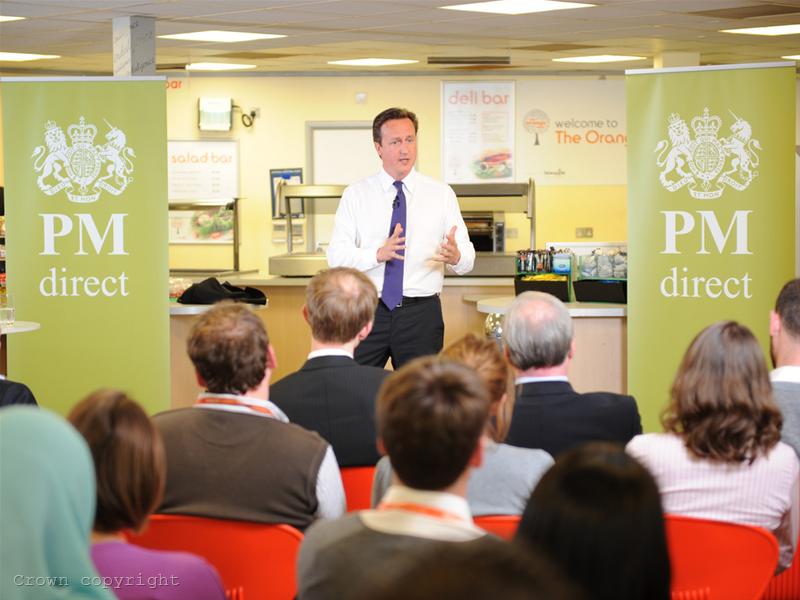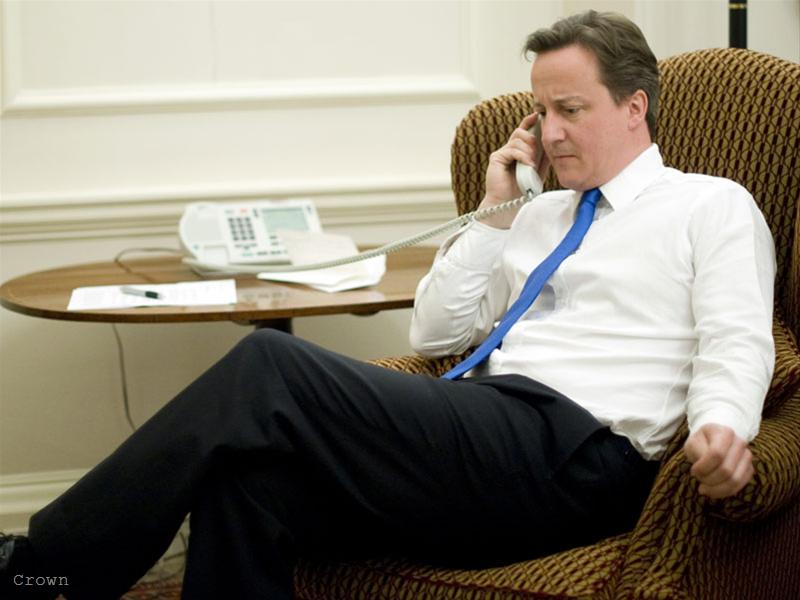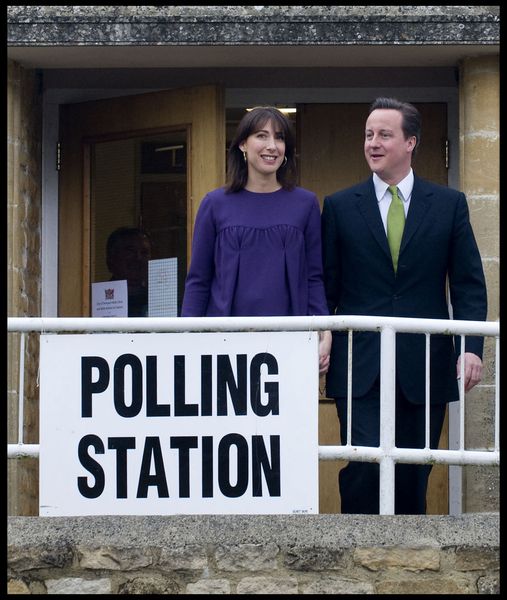Bulgaria entered the first election debate in Britain
Adelina Marini, April 21, 2010
 Great Britain registered in the world of TV election debates with 50 years delay. On April 15 in the studio of ITV1 the leaders of the three biggest parties in Britain gathered together - the Labour party, which is governing for more than 13 years now - Gordon Brown; the Conservatives party David Cameron and the biggest surprise in this campaign - Nick Clegg, who before the TV debate formed as the only and obligatory ally to one of the two oldest British parties, because all polls indicated a hung parliament.
Great Britain registered in the world of TV election debates with 50 years delay. On April 15 in the studio of ITV1 the leaders of the three biggest parties in Britain gathered together - the Labour party, which is governing for more than 13 years now - Gordon Brown; the Conservatives party David Cameron and the biggest surprise in this campaign - Nick Clegg, who before the TV debate formed as the only and obligatory ally to one of the two oldest British parties, because all polls indicated a hung parliament.
Did the debate change anything? Yes, a lot. But let us first see how the debate went on.
Each of the candidates had the right of an introductory statement of a minute and a half. There was no restriction in time, based upon representativity of a party in parliament. The three candidates were precise in using their time for statements and then the debate went on with questions from the audience. They were agreed beforehand but the candidates did not know them. The questions covered issues like immigration policy, law and order, the scandal with MP's expenses, the huge budgetary deficit, healthcare, education and care for the elderly.
The name of Bulgaria appeared in the debate as a byword for low standard during a dispute among the candidates regarding cancer drugs shortages in Britain. The dispute arose after a question about the NHS in Britain (National Healthcare System) and the ideas of the three parties about its optimization. In fact, this was the issue on which the three leaders demonstrated consensus and unanimity that the money should be increased for this sector.
To illustrate how dire the situation of cancer patients was and that drugs shortages  in the 21st century were something that was not normal, the leader of the tories David Cameron said: "Now, what Gordon Brown is not telling you about the people with in cancer, cancer drugs and cancer outcome is after all the things he's talked about, all the money that's gone in, our death rate from cancer is actually worse than Bulgaria's. So, all that's happened has not actually improved the outcome".
in the 21st century were something that was not normal, the leader of the tories David Cameron said: "Now, what Gordon Brown is not telling you about the people with in cancer, cancer drugs and cancer outcome is after all the things he's talked about, all the money that's gone in, our death rate from cancer is actually worse than Bulgaria's. So, all that's happened has not actually improved the outcome".
In essence, the most disputed issue was immigration policy. This was the subject which outlined Nick Clegg (the Liberal Democrats leader) as an alternative, as his ambition was. He perfectly seized the fact that both the conservatives and the Labour had governed long enough to have had the chance to solve the problem with illegal and low-qualified immigration. This gave him an opportunity to make the best of their mistakes in this area and proposed a compromise third way.
It envisages restoration of exit control. In other words the authorities to be able to know whether and when whoever entered the UK, made his way out. Besides, everyone who wants to work in Britain should have a sponsor to finance his trip and, separately, the candidate should have a job. The third element of Nick Clegg's proposal is the candidate to be sent to work in a region where his skills are needed.
To David Cameron's questions how he would guarantee that the candidate would really stay in the region where he was sent to, Mr Clegg said that this could happen through the working permits and through control over employers.
From the length of the dispute on the issue it became clear that immigration policy was a serious problem for the people in the UK. This was the focus of the Conservatives' position that immigration currently was an election issue because it was a problem. It should be dealt with in order not to turn into policy.
 There was also unanimity on the issue with law and order. As a serious problem the British citizens outline small crimes like burglary. The three leaders shared the position that there should be more police in the streets and more focus should be put on work with drugs dependent youngsters, as well as to organise full-time occupation of youngsters in order to prevent them turn to crime just because they had plenty of spare time.
There was also unanimity on the issue with law and order. As a serious problem the British citizens outline small crimes like burglary. The three leaders shared the position that there should be more police in the streets and more focus should be put on work with drugs dependent youngsters, as well as to organise full-time occupation of youngsters in order to prevent them turn to crime just because they had plenty of spare time.
The current prime minister Gordon Brown was forced to defend his party on the issue by quoting statistics, showing that in fact crime was dropping. He claimed that net immigration was also dropping.
Because of the scandal with MP's expenses the three leaders offered serious reforms in the election and political system in general. The most drastic measure was offered by the Labour - a 50% reduction of the number of MPs in the House of Commons, for which the Labour would ask citizens in a referendum. Brown also proposed people to have the right to recall their representatives if they misbehaved or took part in corrupt practices. An old wish of the Labour is the removal of the hereditary principle in the House of Lords (the upper chamber of the British Parliament).
The issue of education was raised by a 16-year old. Here there was no serious discussion, nor clear ideas. Of the position of Gordon Brown it became clear that Labour intended to solve problems in education by pouring more money. The Conservatives want introduction of the system "money to follow the student", an improvement of discipline in class without the right of appeals. Nick Clegg said that "the old system of small sized classes" must be restored.
The debate on the economic issue was relatively apathetic, probably because the positions of the three parties was well known long before the beginning of the campaign. During the 90-minute debate, the current premier Gordon Brown agreed several times with Nick Clegg on some aspects of immigration policy, law and order and the political system. David Cameron said on his behalf that Labour had some good achievements which he, if elected a premier, would keep. Only Nick Clegg was determined that it was time for a change and for an alternative.
The fact that none of the candidates spoke after he was deprived of the word, left a really good impression. The presenter was unyielding and directed the debate skilfully by making everyone who diverted from the current issue to return. In the meantime, whenever a candidate rose a question, concerning an opponent, the presenter would immediately interrupt to give the opponent the word to defend himself.
Another peculiarity, which impresses a foreign viewer, was that the three knew very well the manifestos of their opponents, they spoke to each other in their first names and had perfect behaviour. A probable reason is not only the multi-century political tradition of the UK, but also the preparedness of candidates on all issues on which they have the pretenses to govern afterwords.
Irrefutable contribution for the good preparedness has their education. An  interesting part of Gordon Brown's biography is the fact that he is Scottish. He was born on February 20, 1951 in Scotland. He graduated the Edinburgh university and in 1972 became the youngest rector ever in the university's history.
interesting part of Gordon Brown's biography is the fact that he is Scottish. He was born on February 20, 1951 in Scotland. He graduated the Edinburgh university and in 1972 became the youngest rector ever in the university's history.
The leader of the Conservatives David Cameron has the typical for his party aristocratic descent. He is a direct descendant of king William IV, graduated from the elite school Eton. Then he studied philosophy, politics and economy in Oxford.
Quite curious is the biography of the leader of the libdems Nick Clegg. His mother is a Dutch and his father - semi Russian. He studied anthropology in Cambridge, has an MA in political philosophy from the Minnesota university and an MA in European affairs from the College of Europe in Bruges, Belgium. He speaks Dutch, French, German and Spanish. He was a journalist, a political consultant and an official in the European Commission.
This was the first in a series of there election debates. The second will be on April 22. This first TV clash brought a radical change in the polls. Although within the statistical error, according to a Monday poll, Nick Clegg's party from third is now a leading party with 33% support, followed closely by the Conservatives with 32 per cent and the Labour with 26 per cent. This is a radical change, compared to the results in the beginning of the campaign.
Another element of British politics, which deserves attention, is that there is no party that has the pretenses to go to elections and not have its own shadow cabinet. On the parties' websites you can see clearly the proposals for ministers, enabling the voter to get a very clear perspective who is going to govern him in the years ahead.
The elections in Britain will be on May 6. So far all participants in this process are aware that a radical change is needed. The question is who is going to deliver it.
 | © Crown copyright
| © Crown copyright | © Crown
| © Crown | © Andrew Parsons
| © Andrew Parsons